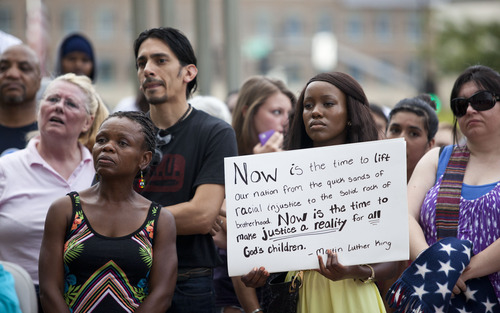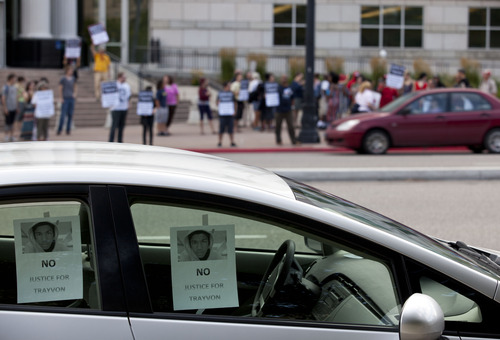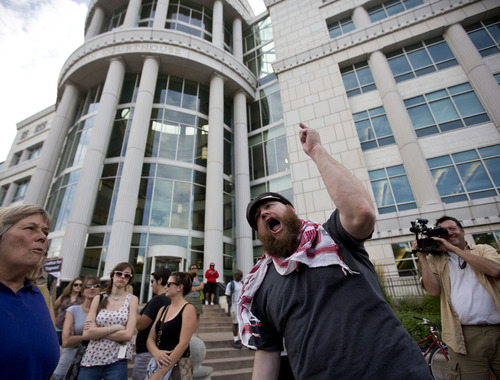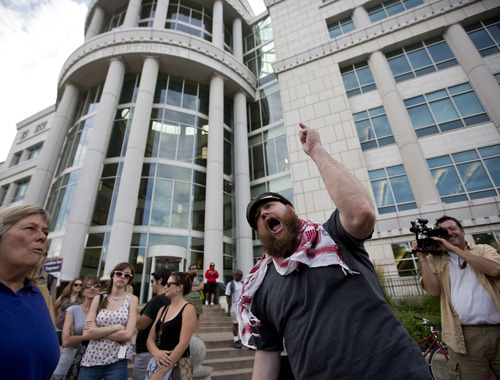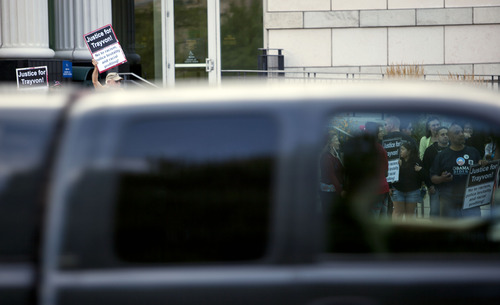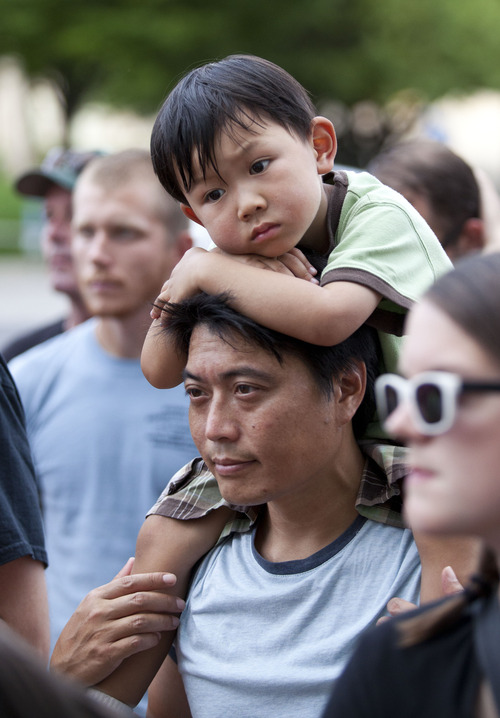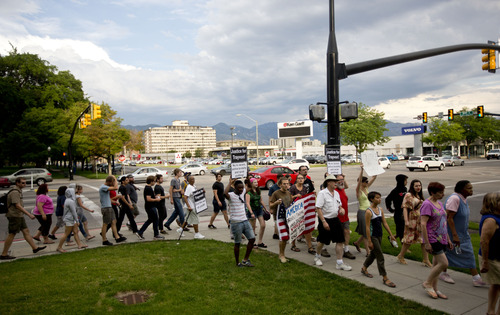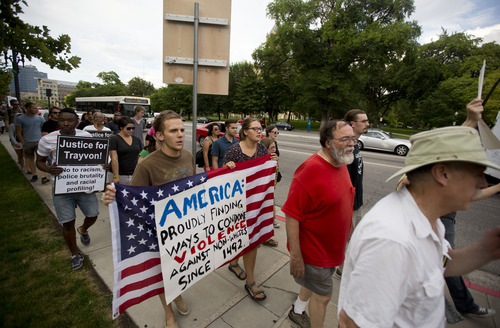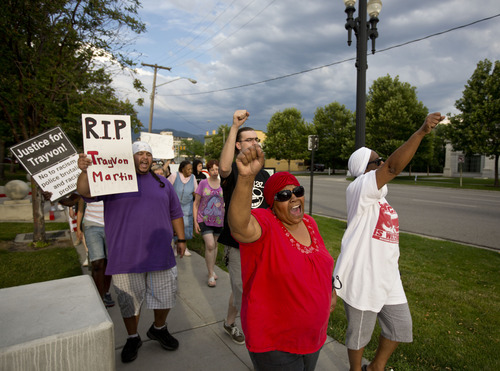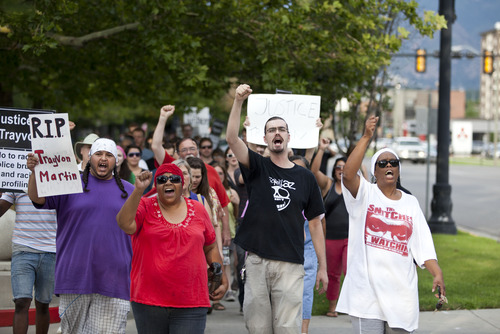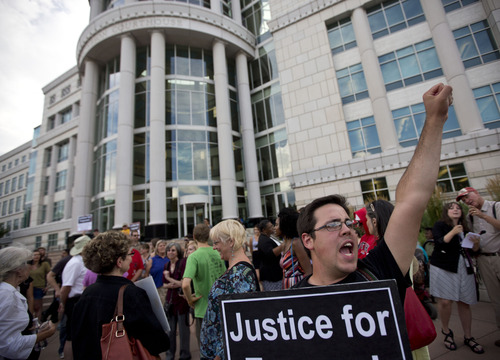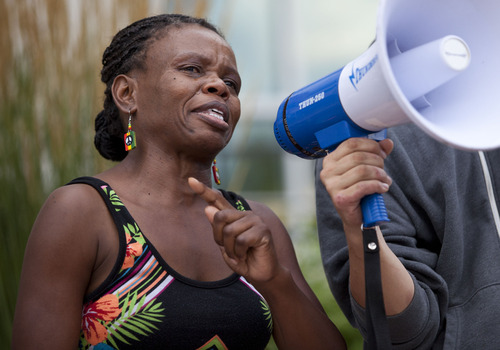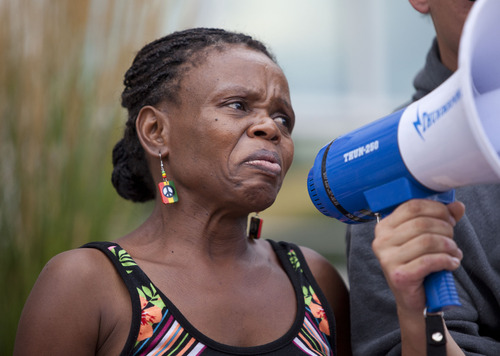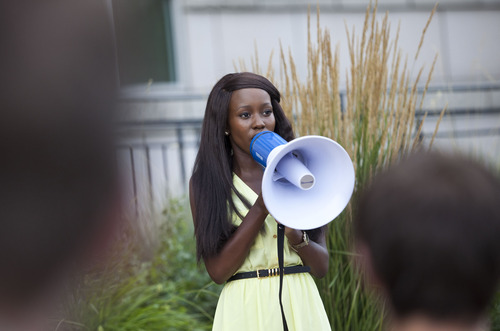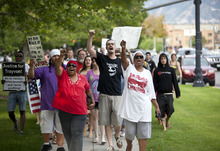Lennie Mahler | The Salt Lake Tribune
Victoria Sethunya and Makuena Mohlakola listen to a speaker during a rally to honor Trayvo
Lennie Mahler | The Salt Lake Tribune
A crowd of about 150 people rally at the Matheson Courthouse to honor Trayvon Martin and c
Lennie Mahler | The Salt Lake Tribune
Jacob Jensen leads a chant during a rally to honor Trayvon Martin and condemn the jury whi
Lennie Mahler | The Salt Lake Tribune
Jacob Jensen leads a chant during a rally to honor Trayvon Martin and condemn the jury whi
Lennie Mahler | The Salt Lake Tribune
Passersby honk at a crowd of about 150 people rally at the Matheson Courthouse to honor Tr
Lennie Mahler | The Salt Lake Tribune
Edmund Fong and his son, Oscar, attend a rally to honor Trayvon Martin and condemn the rul
Lennie Mahler | The Salt Lake Tribune
Protesters march around the Matheson Courthouse to honor Trayvon Martin and condemn the ve
Lennie Mahler | The Salt Lake Tribune
Protesters march around the Matheson Courthouse to honor Trayvon Martin and condemn the ve
Lennie Mahler | The Salt Lake Tribune
Protesters, from left: Angelo Martinez, Janet Cooper, James Hadden and Elaine Buie march a
Lennie Mahler | The Salt Lake Tribune
Protesters Janet Cooper and Elaine Buie, front, Angelo Martinez and James Hadden, second r
Lennie Mahler | The Salt Lake Tribune
Protesters, from left: Angelo Martinez, Janet Cooper, James Hadden and Elaine Buie march a
Lennie Mahler | The Salt Lake Tribune
Ivan Ottaviano of Provo chants during a rally condemning the verdict which found George Zi
Lennie Mahler | The Salt Lake Tribune
Victoria Secthunya speaks about the plight of black youth and their families during a rall
Lennie Mahler | The Salt Lake Tribune
Victoria Setchunya speaks about the plight of black youth and their families during a rall
Lennie Mahler | The Salt Lake Tribune
Makuena Mohlakola sings "Lift Every Voice and Sing" during a rally at the Mathes
Lennie Mahler | The Salt Lake Tribune
Victoria Sethunya and Makuena Mohlakola listen to a speaker during a rally to honor Trayvon Martin and condemn the jury which found George Zimmerman not guilty of murder. Salt Lake City, Utah. Monday, July 15, 2013.
Lennie Mahler | The Salt Lake Tribune
A crowd of about 150 people rally at the Matheson Courthouse to honor Trayvon Martin and condemn the verdict which found George Zimmerman not guilty of murder. Salt Lake City, Utah. Monday, July 15, 2013.
Lennie Mahler | The Salt Lake Tribune
Jacob Jensen leads a chant during a rally to honor Trayvon Martin and condemn the jury which found George Zimmerman not guilty of murder. Jensen asked, "Who will indict the US justice system for finding George Zimmerman innocent?" Salt Lake City, Utah. Monday, July 15, 2013.
Lennie Mahler | The Salt Lake Tribune
Jacob Jensen leads a chant during a rally to honor Trayvon Martin and condemn the jury which found George Zimmerman not guilty of murder. Jensen asked, "Who will indict the US justice system for finding George Zimmerman innocent?" Salt Lake City, Utah. Monday, July 15, 2013.
Lennie Mahler | The Salt Lake Tribune
Passersby honk at a crowd of about 150 people rally at the Matheson Courthouse to honor Trayvon Martin and condemn the verdict which found George Zimmerman not guilty of murder. Salt Lake City, Utah. Monday, July 15, 2013.
Lennie Mahler | The Salt Lake Tribune
Edmund Fong and his son, Oscar, attend a rally to honor Trayvon Martin and condemn the ruling which found George Zimmerman not guilty of murder. Salt Lake City, Utah. Monday, July 15, 2013.
Lennie Mahler | The Salt Lake Tribune
Protesters march around the Matheson Courthouse to honor Trayvon Martin and condemn the verdict which found George Zimmerman not guilty of murder. Salt Lake City, Utah. Monday, July 15, 2013.
Lennie Mahler | The Salt Lake Tribune
Protesters march around the Matheson Courthouse to honor Trayvon Martin and condemn the verdict which found George Zimmerman not guilty of murder. Salt Lake City, Utah. Monday, July 15, 2013.
Lennie Mahler | The Salt Lake Tribune
Protesters, from left: Angelo Martinez, Janet Cooper, James Hadden and Elaine Buie march around the Matheson Courthouse and chant during a rally condemning the verdict which found George Zimmerman not guilty of murdering Trayvon Martin. Salt Lake City, Utah. Monday, July 15, 2013.
Lennie Mahler | The Salt Lake Tribune
Protesters Janet Cooper and Elaine Buie, front, Angelo Martinez and James Hadden, second row, march around the Matheson Courthouse and chant during a rally condemning the verdict which found George Zimmerman not guilty of murdering Trayvon Martin. Salt Lake City, Utah. Monday, July 15, 2013.
Lennie Mahler | The Salt Lake Tribune
Protesters, from left: Angelo Martinez, Janet Cooper, James Hadden and Elaine Buie march around the Matheson Courthouse and chant during a rally condemning the verdict which found George Zimmerman not guilty of murdering Trayvon Martin. Salt Lake City, Utah. Monday, July 15, 2013.
Lennie Mahler | The Salt Lake Tribune
Ivan Ottaviano of Provo chants during a rally condemning the verdict which found George Zimmerman not guilty of murdering Trayvon Martin. Salt Lake City, Utah. Monday, July 15, 2013.
Lennie Mahler | The Salt Lake Tribune
Victoria Secthunya speaks about the plight of black youth and their families during a rally condemning the verdict which found George Zimmerman not guilty of murdering Trayvon Martin. Salt Lake City, Utah. Monday, July 15, 2013.
Lennie Mahler | The Salt Lake Tribune
Victoria Setchunya speaks about the plight of black youth and their families during a rally condemning the verdict which found George Zimmerman not guilty of murdering Trayvon Martin. Salt Lake City, Utah. Monday, July 15, 2013.
Lennie Mahler | The Salt Lake Tribune
Makuena Mohlakola sings "Lift Every Voice and Sing" during a rally at the Matheson Courthouse to honor Trayvon Martin and condemn the verdict which found George Zimmerman not guilty of murder. Salt Lake City, Utah. Monday, July 15, 2013.


